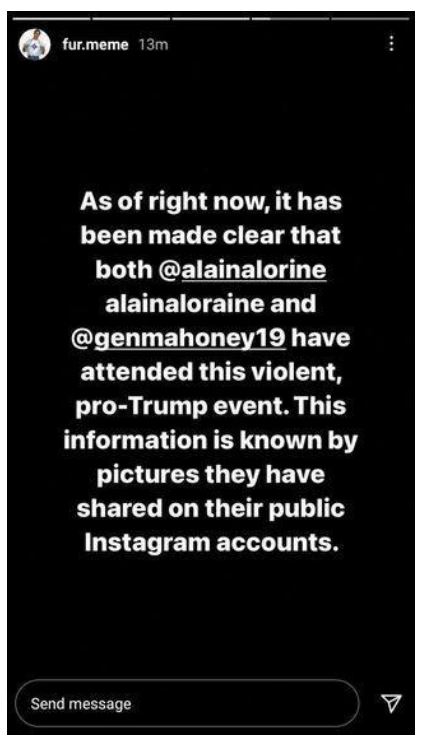Facebook Defeats Lawsuit Over Its January 6 Explanation–Mahoney v. Meta
The court summarizes the allegations:
Plaintiff Genevieve Mahoney is a college student at Furman University who has an Instagram account with the username @genmahoney19. Mahoney attended what she describes as a “Rally” to protest the results of the 2020 United States presidential election. On January 6, 2021, at approximately 2:00 p.m. Eastern Time, Mahoney posted on her Instagram account the single image reproduced below and captioned it “Our Capitol.”…Meta “disabled and deleted” Mahoney’s Instagram account almost a full week after the January 6 protests.
This is the photo in question. As you can see, it doesn’t depict any obviously illegal activity (though photos like this still make my stomach turn):
Facebook quickly cracked down on content promoting the January 6 “rally”/insurrection and issued an emergency news statement:
. . . We are appalled by the violence at the Capitol today. We are treating these events as an emergency . . . For those of you who are wondering, here are the actions we’re taking: First, we have been searching for and removing the following content:
• Praise and support of the storming of the Capitol.
• Calls to bring weapons to locations across the US—not just in Washington but anywhere in the US—including protests.
• Incitement or encouragement of the events at the Capitol, including videos and photos from the protestors. At this point they represent promotion of criminal activity which violates our policies.
• Calls for protests—even peaceful ones—if they violate curfew in DC.
• Attempts to restage violence tomorrow or in the coming days
Mahoney argued that the third bullet point defamed her by indicating that her photo had promoted “criminal activity.” The court grants Facebook’s motion to dismiss.
The defamation analysis isn’t complicated. Facebook’s emergency news statement isn’t “of and concerning” Mahoney because the third bullet referred to all “videos and photos from the protestors”–a group way too large to specifically identify Mahoney. The court adds that Facebook didn’t post its statement to Instagram, so there’s no evidence that any reader connected the statement to her photo.
To get around this, Mahoney pointed to postings on an Instagram account, @fur.meme, which caters to the Furman University community. That account highlighted Mahoney’s participation in the J6 “rally”/insurrection. For example, the account posted:
The court is confused by the purported linkage:
Mahoney does not allege that the Emergency News Statement was published directly to the @fur.meme Instagram account or even to the Instagram platform. Mahoney does not allege that the @fur.meme Instagram posts make any reference to the Emergency News Statement, and the posts themselves show the opposite. The @fur.meme posts state that Mahoney was known to have attended the “violent, pro-Trump event” based on “pictures [she] shared on [her] public Instagram account[].” The posts do not refer to the Emergency News Statement, and it is not clear that the person(s) behind @fur.meme saw Meta’s statement at all. Mahoney does not allege that a single person (1) saw the Emergency News Statement, much less understood its allegedly defamatory meaning towards her, or who (2) legitimately read that allegedly defamatory meaning as applying to her
The court reiterates that this case is not a close call: “Meta’s statement does not accuse Mahoney of a crime because it does not refer to her at all. No reasonable reader could have reasonably understood the Emergency News Statement in the alleged defamatory sense.”
Implications
In dismissing the complaint, the court deferred consideration on Facebook’s anti-SLAPP motion until after the amended complaint. This gives Mahoney some incentives to cut her losses. If she refiles and then loses on anti-SLAPP grounds, she will have to pay dearly for Facebook’s phalanx of high-priced lawyers. (I counted 9 defense attorneys working on this case across four Biglaw firms: Orrick, Mayer Brown, Bass Berry, and Gibson Dunn…I shudder to imagine how big the defense bill has already gotten). Will she take the gentle offramp offered by the court, or will she double-down with an amended complaint and risk it for the biscuit?
This case reminded me of the (uncited) Stossel v. Facebook case. Stossel unsuccessfully sued Facebook for defamation for fact-checking his posts. Both cases fit into the broader genre of lawsuits over a service’s “explanations” of its editorial decisions. I have repeatedly warned that services face significant legal liability for providing explanations given that plaintiffs will tendentiously read the explanations, as this case highlights. This legal risk is one of the many downsides of government-compelled explanations, an issue pending before the Supreme Court in the NetChoice v. Florida and Texas cases. Elsewhere, I have explained why compelled explanations don’t deserve deferential constitutional scrutiny.
I would add this case to the overflowing stack of unsuccessful cases about online content removal and account terminations. All of the other cases have failed, and so has this one.
Finally, this case is one of many attempts to judicially rehabilitate the reputation of the January 6 “rally” and its participants. I’ve blogged on legal cases relating to the insurrection numerous times (see some of the posts here). When Trump exhorted the J6 “rallygoers” to “fight like hell…,” it turns out that he also meant “…in court.”
Case citation: Mahoney v. Meta Platforms, Inc., 2024 WL 68550 (N.D. Cal. Jan. 6, 2024). (Releasing the opinion *on* January 6 gets a *chef’s kiss*).
* * *
Mahoney is represented by the “Liberty Justice Center,” which has the kind of name that makes me wonder if they are for or against “liberty” and “justice,” at least as I would use those terms. They framed this case: “Facebook is not only violating Genevieve’s constitutional right to free speech but is using her exercise of free speech to defame her character. This censorship of Americans must be stopped.” 🙄 The complaint demanded $168M in damages. However, can you really put a price on LIBERTY?
* * *
February 2025 Update: As my initial blog post noted, Mahoney could have taken a gentle offramp by accepting the initial dismissal without the court ruling on Facebook’s anti-SLAPP motion, which comes with a mandatory attorneys’ fee shift. Instead, Mahoney doubled-down and filed a second amended complaint, but the court easily dismisses it. Mahoney v. Meta Platforms, Inc., 2025 WL 563459 (N.D. Cal. Feb. 20, 2025).
By trying again, it meant the court finally considered Facebook’s anti-SLAPP motion to strike, which the court granted. As a result, Mahoney is now on the hook to reimburse Facebook for its overpriced phalanx of defense lawyers–I’m sure that bill will be six figures. As I mentioned before, you can’t put a price on liberty, but you can–and the court will–put a (very high) price on Mahoney’s education about liberty.
* * *
Selected blog posts on liability for explanations
* Facebook Defeats Lawsuit Over Its Fact-Checking Explanations–Stossel v. Meta
* Another Example of How “Notice and Explanations” Requirements are a Liability Trap–Shared v. Facebook
* Facebook Moderator Defeats Defamation Lawsuit Over Termination Explanation–Margolies v. Rudolph
* Twitter’s Content Moderation Explanations Aren’t Defamatory Per Se–Isaac v. Twitter


